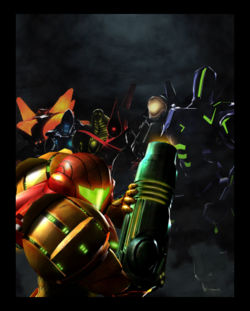Difference between revisions of "Portal: Metroid"
m |
m |
||
| Line 23: | Line 23: | ||
in 1994, ''[[Super Metroid]]'' was released for the [[Super Nintendo]]. The game greatly expanded the previously explored [[Zebes]] and the [[Space Pirates]]. The game was tremendously popular and acclaimed as one of the greatest games of the generation. | in 1994, ''[[Super Metroid]]'' was released for the [[Super Nintendo]]. The game greatly expanded the previously explored [[Zebes]] and the [[Space Pirates]]. The game was tremendously popular and acclaimed as one of the greatest games of the generation. | ||
| − | After this, the Metroid series went quiet for six years. No game was released for the [[N64]], but in 2000 it was announced that the fledgling developing company, [[Retro Studios]], would be developing the next Metroid game on the [[Gamecube]]. A 2D Metroid game for the [[Gameboy Advance]] was also announced. In 2002, both ''[[Metroid Prime]]'' and ''[[Metroid Prime]]'' were both released. Whereas ''Fusion'' was a continuation of Super Metroid, ''Prime'' | + | After this, the Metroid series went quiet for six years. No game was released for the [[N64]], but in 2000 it was announced that the fledgling developing company, [[Retro Studios]], would be developing the next Metroid game on the [[Gamecube]]. A 2D Metroid game for the [[Gameboy Advance]] was also announced. In 2002, both ''[[Metroid Prime]]'' and ''[[Metroid Prime]]'' were both released. Whereas ''Fusion'' was a continuation of Super Metroid, ''Prime'' took the game to a new first person perspective taking place between ''Metroid'' and ''Return of Samus''. |
The Prime series continued with ''[[Metroid Prime 2: Echoes]]'' in 2004. Two Prime spinoff games were made outside of Retro, ''[[Metroid Prime Pinball]]'' and ''[[Metroid Prime Hunters]]'' on the [[Nintendo DS]]. In 2007, the main Prime trilogy was concluded with ''[[Metroid Prime 3: Corruption]]'' on the [[Wii]].. | The Prime series continued with ''[[Metroid Prime 2: Echoes]]'' in 2004. Two Prime spinoff games were made outside of Retro, ''[[Metroid Prime Pinball]]'' and ''[[Metroid Prime Hunters]]'' on the [[Nintendo DS]]. In 2007, the main Prime trilogy was concluded with ''[[Metroid Prime 3: Corruption]]'' on the [[Wii]].. | ||
Revision as of 19:10, 14 September 2007

| |
| Metroid | |
| Developer | Nintendo |
| Games | List of all games |
| Debut | Metroid (1986) |
| Gallery | GH Gallery |
Metroid is a futuristic action game that takes place in outer space. After along dormant period, the game has been revived with a series of first person adventure games. The games follow the adventures of bounty hunter Samus Aran.
Backstory
Metroid was produced by Gunpei Yokoi, but was largely the brainchild of the director Yoshio Sakamoto and scenario writer for the first three games, Makoto Kanoh . The first game did poorly in Japan, but became quite popular in America.
The Metroid series was notable for doing two things in its first installment. It was one of the first games to have a password system for resuming gameplay. It also introduced Samus Aran, one of the first major female video game protagonists. However, that was only revealed if the player beat the game fast enough. Then they would get to find out Samus was actually a woman, much to the surprise of gamers.
The second installment was released on the Gameboy five years later. Metroid II: Return of Samus greatly expanded on the first game, despite its limited platform. The story had Samus traveling to SR388 to exterminate all the Metroids. In the game, her gunship was introduced, the Metroids received multiple stages of life, and Samus's arsenal was greatly expanded.
in 1994, Super Metroid was released for the Super Nintendo. The game greatly expanded the previously explored Zebes and the Space Pirates. The game was tremendously popular and acclaimed as one of the greatest games of the generation.
After this, the Metroid series went quiet for six years. No game was released for the N64, but in 2000 it was announced that the fledgling developing company, Retro Studios, would be developing the next Metroid game on the Gamecube. A 2D Metroid game for the Gameboy Advance was also announced. In 2002, both Metroid Prime and Metroid Prime were both released. Whereas Fusion was a continuation of Super Metroid, Prime took the game to a new first person perspective taking place between Metroid and Return of Samus.
The Prime series continued with Metroid Prime 2: Echoes in 2004. Two Prime spinoff games were made outside of Retro, Metroid Prime Pinball and Metroid Prime Hunters on the Nintendo DS. In 2007, the main Prime trilogy was concluded with Metroid Prime 3: Corruption on the Wii..